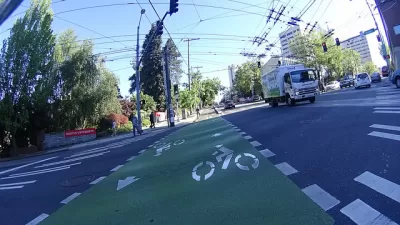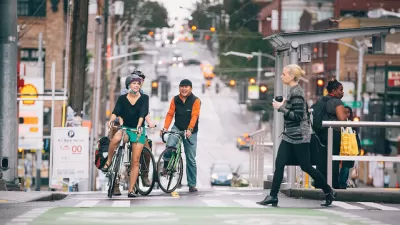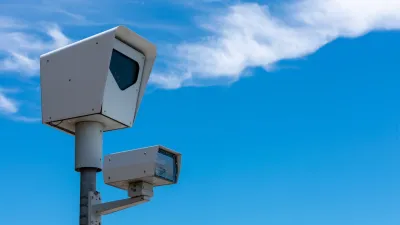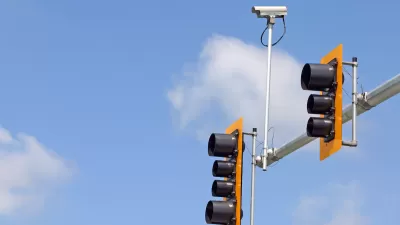Almost half of bike helmet citations in the city are issued to people experiencing homelessness.

Seattle's all-ages bicycle helmet law has long prompted criticism, and new data shows uneven enforcement that disproportionately affects the unhoused. Since 2017, Seattle police have only given out 117 citations for lack of helmet use. Of those, 50 or more were given to homeless people, with that number growing to 60% in 2020. This low-end estimate, arrived at through an analysis of citations and other public records, shows the disproportionate burden of the helmet law, with enforcement primarily targeted at people least able to pay the ticket—or purchase a helmet. When a law is consistently flouted by a large percentage of the population, police can "pick and choose who they stop," says Tom Fucoloro of the Seattle Bike Blog. This vast amount of discretion opens the door to discrimination and uneven enforcement.
Seattle's bike helmet citations are indicative of a broader trend. Studies in other parts of the country show similar disparities in the enforcement of low-level offenses such as jaywalking, prompting questions about the unintended consequences of this kind of policing and how such unwarranted stops amount to excuses to "stop-and-frisk." Barb Chamberlain, active transportation director for the Washington State Department of Transportation, sees a pattern. "There’s a large bucket that the bike helmet thing fits into," she says, "which is the way we’ve criminalized normal human behavior."
FULL STORY: Nearly half of Seattle’s helmet citations go to homeless people

Planetizen Federal Action Tracker
A weekly monitor of how Trump’s orders and actions are impacting planners and planning in America.

Congressman Proposes Bill to Rename DC Metro “Trump Train”
The Make Autorail Great Again Act would withhold federal funding to the system until the Washington Metropolitan Area Transit Authority (WMATA), rebrands as the Washington Metropolitan Authority for Greater Access (WMAGA).

The Simple Legislative Tool Transforming Vacant Downtowns
In California, Michigan and Georgia, an easy win is bringing dollars — and delight — back to city centers.

Supporting Cycling Takes More Than Just Bike Lanes
Safe, protected bike lanes are a key part of a city’s bike infrastructure — but secure parking, e-bike charging, and other amenities can also influence people’s shift to cycling.

Judge Blocks Anti-DEI Rules for Transportation, Housing Grants
A second injunction blocks the Trump administration from enforcing new regulations for federal funding.

Unhoused People in San Jose Could Face Arrest if They Refuse Shelter
A policy proposed by the city’s mayor would give law enforcement the option to arrest homeless residents if they refuse three offers of housing.
Urban Design for Planners 1: Software Tools
This six-course series explores essential urban design concepts using open source software and equips planners with the tools they need to participate fully in the urban design process.
Planning for Universal Design
Learn the tools for implementing Universal Design in planning regulations.
Smith Gee Studio
City of Charlotte
City of Camden Redevelopment Agency
City of Astoria
Transportation Research & Education Center (TREC) at Portland State University
US High Speed Rail Association
City of Camden Redevelopment Agency
Municipality of Princeton (NJ)





























